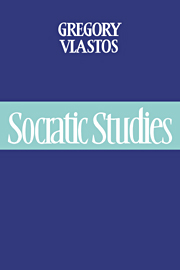Book contents
- Frontmatter
- Contents
- Editor's preface
- Abbreviations
- 1 The Socratic elenchus: method is all
- 2 Socrates' disavowal of knowledge
- 3 Is the “Socratic fallacy” Socratic?
- 4 The historical Socrates and Athenian democracy
- 5 The Protagoras and the Laches
- Epilogue: Socrates and Vietnam
- Additional notes
- Bibliography
- Index of passages cited
- Index of ancient names
- Index of modern scholars
- Index of Greek words
3 - Is the “Socratic fallacy” Socratic?
Published online by Cambridge University Press: 29 October 2009
- Frontmatter
- Contents
- Editor's preface
- Abbreviations
- 1 The Socratic elenchus: method is all
- 2 Socrates' disavowal of knowledge
- 3 Is the “Socratic fallacy” Socratic?
- 4 The historical Socrates and Athenian democracy
- 5 The Protagoras and the Laches
- Epilogue: Socrates and Vietnam
- Additional notes
- Bibliography
- Index of passages cited
- Index of ancient names
- Index of modern scholars
- Index of Greek words
Summary
In the preceding chapter I argued for a hypothesis which, if true, would solve one of the standing puzzles in the history of Western philosophy: how a man who was anything but a skeptic – an earnest moralist, eager to propagate new, powerful moral doctrines of his own – betrayed no awareness of inconsistency in claiming that he had the strongest of reasons for those doctrines and yet said he did not know if those doctrines were true. There is no inconsistency on the hypothesis that he is making a systematically dual use of his words for knowing, disavowing what philosophers had generally understood by “knowledge” at the time, namely, what I have called “knowledgec,” whose hallmark is infallible certainty, while avowing the highly fallible knowledge I have called “knowledgeE,” where Socrates’ claim to know p is simply the claim that p is elenctically viable, i.e., that if he were to pit it against its contradictory in elenctic argument it would prevail.
To say that this has been a standing puzzle of philosophical historiography may seem surprising, for it has not been treated as such in the copious literature on the subject. The reason for this, I believe, is simple: the relevant textual evidence has not been confronted. The evidence for one horn of the dilemma – for Socrates' disavowal of knowledge – is spread out so abundantly on the surface of Plato's text that no one reading it even in a poor translation could miss it.
- Type
- Chapter
- Information
- Socratic Studies , pp. 67 - 86Publisher: Cambridge University PressPrint publication year: 1993

